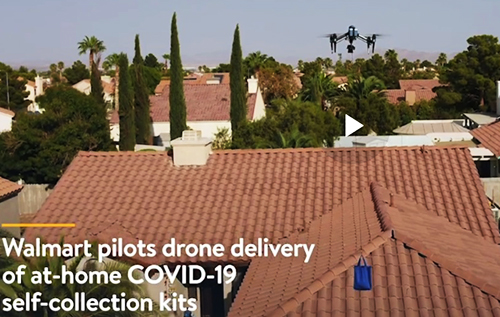Walmart, Quest Diagnostics, and DroneUp Collaborate on Pilot Project to Deliver COVID-19 Laboratory Tests to Consumers in Select Cities
Coronavirus pandemic expected to spur wider acceptance of drone delivery services for clinical laboratory specimens and medical supplies
Routine delivery of clinical laboratory specimens and medical supplies by drone moved one step closer to reality with news that Walmart (NYSE:WMT), Quest Diagnostics (NYSE:DGX), and DroneUp of Virginia Beach, Va., are partnering to bring at-home self-collection COVID-19 test kits to residents of several areas hard hit by the COVID-19 pandemic.
In its race to keep pace with online retailer Amazon (NASDAQ:AMZN), Walmart last September implemented two drone-delivery trials. One, according to Progressive Grocer, is with Tel Aviv, Israel-based drone company Flytrex, to deliver select grocery and household essentials in and around Fayetteville, N.C. The other trial program is with drone company Zipline of San Francisco, to test delivery of certain health and wellness products to areas around Walmart’s headquarters in Bentonville, Ark., Progressive Grocer also reported.
Then, Walmart announced a third pilot project for home delivery—one that could potentially affect clinical laboratories. This time, in collaboration with Quest and DroneUp, Walmart is piloting delivery of at-home COVID-19 collection kits in North Las Vegas, and Cheektowaga, New York, a Walmart news release stated.
Is this yet another example of how the COVID-19 pandemic will continue to drive shifts in delivery of key healthcare services? Probably.
According to Walmart’s news release, “Patients who qualify for drone delivery of the COVID-19 self-collection kits must live in a single-family residence within a 1-mile radius of the designated [Walmart] Supercenters in North Las Vegas and Cheektowaga. The kits will land on the driveway, front sidewalk, or backyard of the customer’s home, depending on where there are cars and trees. There is no delivery or kit cost for customers electing to receive an at-home [COVID-19] kit delivered via drone. Once the kits are delivered, the person will perform a self-administered nasal swab in the privacy of their home and send their sample back to Quest Diagnostics for testing using the included prepaid shipping label.”

The giant retailer’s expanding use of drone delivery systems will likely lead to greater acceptance among consumers of unmanned aerial vehicles for delivering all sorts of personal items, as well as various types of clinical laboratory specimens. If consumers embrace drone delivery systems, clinical laboratories with existing courier and logistics networks may experience another disruption in how they do business.
In a news release following the announcement of a yet another drone-delivery service of COVID-19 at-home test kits—this time in El Paso, Texas,—Amanda Jenkins, Vice President of Operation Support and Implementation, Walmart US Health and Wellness, said, “Walmart has been serving the El Paso community throughout the pandemic with drive-thru testing sites and extended testing hours, and we wanted to provide another way to access testing that provides convenience and leverages technology, while learning how drones could impact the delivery of healthcare in the future,” KTSM-9 TV reported.
Drone Delivery Systems Worldwide for Healthcare
The United States is not the only country turning to drone technology to speed deliveries and reduce person-to-person contact during the pandemic. A World Economic Forum blog post outlined the critical role drones are playing in China, the world’s most populated country, as it responds to the health crisis.
“At the moment of life and death, the air transport network can significantly confine the flow of people, avoid unnecessary physical contact, and prevent secondary transmission,” Lv Yinxiang, Secretary of the Party Committee of the County People’s Hospital, said in the blog post. “Medical samples delivered through air can shrink the delivery time … while saving precious field resources.”
Amazon also is predicting a bright future for drone delivery of all types of goods. In August, Amazon’s Prime Air drone delivery service received approval from the Federal Aviation Administration (FAA) to operate its fleet of drones, CNBC reported. Amazon launched its drone project in 2013 and began the process of seeking FAA approval in 2019.
In “UPS Expands Drone Delivery Service for Transporting Clinical Laboratory Specimens Across Healthcare Systems to Include Delivering Prescriptions from CVS Pharmacy to Customers’ Homes,” Dark Daily reported on UPS’ plans to become a major player in healthcare’s use of drones by partnering with CVS Health to not only transport clinical laboratory specimens, but also make pharmacy deliveries to customers’ homes.
And in “WakeMed Uses Drone to Deliver Patient Specimens,” Dark Daily’s sister publication, The Dark Report (TDR), reported on UPS’ launch of a drone delivery service on the WakeMed Health and Hospitals medical campus in Raleigh, N.C. The implementation followed a two-year test period during which UPS used drones manufactured by Matternet of Menlo Park, Calif., to fly clinical laboratory specimens from a medical complex of physicians’ offices to the health system’s clinical laboratory.
COVID-19 Pandemic Drives Drone Delivery System Development
Tom Ward, Walmart’s Senior Vice President for Customer Product, predicts the drone delivery systems being rolled out during the COVID-19 pandemic will increase the use of contactless delivery for all types of deliveries, not just healthcare.
“There’s a lot we can learn from our drone delivery pilots to help determine what roles drones can play in pandemic response, healthcare delivery, and retail,” he said in the Walmart news release. “We hope drone delivery of self-collection kits will shape contactless testing capabilities on a larger scale and continue to bolster the innovative ways Walmart plans to use drone delivery in the future.”
The widespread use of drone technology appears to be soaring to new heights as the COVID-19 pandemic moves forward into the new year. Clinical laboratory managers will want to keep their eyes on the skies as this new delivery system becomes more commonplace and potentially disrupts the way laboratory specimens traditionally have traveled to and from medical laboratories.
—Andrea Downing Peck
Related Information:
Walmart Adds Even More Fuel to Drone Delivery
Walmart Now Piloting Drone Delivery of COVID-19 At-Home Self-Collection Kits
3 Ways China Is Using Drones to Fight Coronavirus




